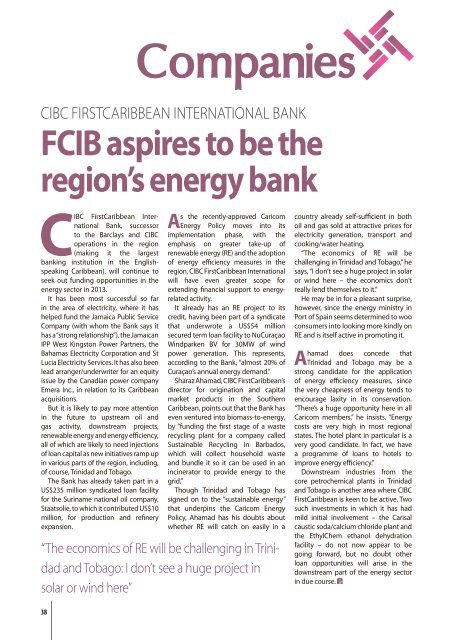ENERGY Caribbean Yearbook (2013-14)
- No tags were found...
Create successful ePaper yourself
Turn your PDF publications into a flip-book with our unique Google optimized e-Paper software.
Companies<br />
CIBC firstcaribbean international bank<br />
FCIB aspires to be the<br />
region’s energy bank<br />
Countries<br />
CIBC First<strong>Caribbean</strong> International<br />
Bank, successor<br />
to the Barclays and CIBC<br />
operations in the region<br />
(making it the largest<br />
banking institution in the Englishspeaking<br />
<strong>Caribbean</strong>), will continue to<br />
seek out funding opportunities in the<br />
energy sector in <strong>2013</strong>.<br />
It has been most successful so far<br />
in the area of electricity, where it has<br />
helped fund the Jamaica Public Service<br />
Company (with whom the Bank says it<br />
has a “strong relationship”), the Jamaican<br />
IPP West Kingston Power Partners, the<br />
Bahamas Electricity Corporation and St<br />
Lucia Electricity Services. It has also been<br />
lead arranger/underwriter for an equity<br />
issue by the Canadian power company<br />
Emera Inc., in relation to its <strong>Caribbean</strong><br />
acquisitions.<br />
But it is likely to pay more attention<br />
in the future to upstream oil and<br />
gas activity, downstream projects,<br />
renewable energy and energy efficiency,<br />
all of which are likely to need injections<br />
of loan capital as new initiatives ramp up<br />
in various parts of the region, including,<br />
of course, Trinidad and Tobago.<br />
The Bank has already taken part in a<br />
US$235 million syndicated loan facility<br />
for the Suriname national oil company,<br />
Staatsolie, to which it contributed US$10<br />
million, for production and refinery<br />
expansion.<br />
As the recently-approved Caricom<br />
Energy Policy moves into its<br />
implementation phase, with the<br />
emphasis on greater take-up of<br />
renewable energy (RE) and the adoption<br />
of energy efficiency measures in the<br />
region, CIBC First<strong>Caribbean</strong> International<br />
will have even greater scope for<br />
extending financial support to energyrelated<br />
activity.<br />
It already has an RE project to its<br />
credit, having been part of a syndicate<br />
that underwrote a US$54 million<br />
secured term loan facility to NuCuraçao<br />
Windparken BV for 30MW of wind<br />
power generation. This represents,<br />
according to the Bank, “almost 20% of<br />
Curaçao’s annual energy demand.”<br />
Sharaz Ahamad, CIBC First<strong>Caribbean</strong>’s<br />
director for origination and capital<br />
market products in the Southern<br />
<strong>Caribbean</strong>, points out that the Bank has<br />
even ventured into biomass-to-energy,<br />
by “funding the first stage of a waste<br />
recycling plant for a company called<br />
Sustainable Recycling in Barbados,<br />
which will collect household waste<br />
and bundle it so it can be used in an<br />
incinerator to provide energy to the<br />
grid.”<br />
Though Trinidad and Tobago has<br />
signed on to the “sustainable energy”<br />
that underpins the Caricom Energy<br />
Policy, Ahamad has his doubts about<br />
whether RE will catch on easily in a<br />
“The economics of RE will be challenging in Trinidad<br />
and Tobago: I don’t see a huge project in<br />
solar or wind here”<br />
country already self-sufficient in both<br />
oil and gas sold at attractive prices for<br />
electricity generation, transport and<br />
cooking/water heating.<br />
“The economics of RE will be<br />
challenging in Trinidad and Tobago,” he<br />
says, “I don’t see a huge project in solar<br />
or wind here – the economics don’t<br />
really lend themselves to it.”<br />
He may be in for a pleasant surprise,<br />
however, since the energy ministry in<br />
Port of Spain seems determined to woo<br />
consumers into looking more kindly on<br />
RE and is itself active in promoting it.<br />
Ahamad does concede that<br />
Trinidad and Tobago may be a<br />
strong candidate for the application<br />
of energy efficiency measures, since<br />
the very cheapness of energy tends to<br />
encourage laxity in its conservation.<br />
“There’s a huge opportunity here in all<br />
Caricom members,” he insists. “Energy<br />
costs are very high in most regional<br />
states. The hotel plant in particular is a<br />
very good candidate. In fact, we have<br />
a programme of loans to hotels to<br />
improve energy efficiency.”<br />
Downstream industries from the<br />
core petrochemical plants in Trinidad<br />
and Tobago is another area where CIBC<br />
First<strong>Caribbean</strong> is keen to be active. Two<br />
such investments in which it has had<br />
mild initial involvement – the Carisal<br />
caustic soda/calcium chloride plant and<br />
the EthylChem ethanol dehydration<br />
facility – do not now appear to be<br />
going forward, but no doubt other<br />
loan opportunities will arise in the<br />
downstream part of the energy sector<br />
in due course.<br />
38


















